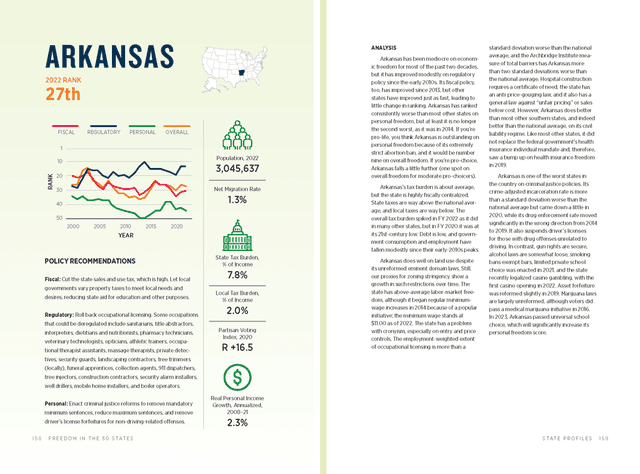Policy Recommendations
- Fiscal Cut the state sales and use tax, which is high. Let local governments vary property taxes to meet local needs and desires, reducing state aid for education and other purposes.
- Regulatory Roll back occupational licensing. Some occupations that could be deregulated include sanitarians, title abstractors, interpreters, dietitians and nutritionists, pharmacy technicians, veterinary technologists, opticians, athletic trainers, occupational therapist assistants, massage therapists, private detectives, security guards, landscaping contractors, tree trimmers (locally), funeral apprentices, collection agents, 911 dispatchers, tree injectors, construction contractors, security alarm installers, well drillers, mobile home installers, and boiler operators.
- Personal Enact criminal justice reforms to remove mandatory minimum sentences, reduce maximum sentences, and remove driver’s license forfeitures for non-driving-related offenses.
Analysis
Arkansas has been mediocre on economic freedom for most of the past two decades, but it has improved modestly on regulatory policy since the early 2010s. Its fiscal policy, too, has improved since 2013, but other states have improved just as fast, leading to little change in ranking. Arkansas has ranked consistently worse than most other states on personal freedom, but at least it is no longer the second worst, as it was in 2014. If you’re pro-life, you think Arkansas is outstanding on personal freedom because of its extremely strict abortion ban, and it would be number nine on overall freedom. If you’re pro-choice, Arkansas falls a little further (one spot on overall freedom for moderate pro-choicers).
Arkansas’s tax burden is about average, but the state is highly fiscally centralized. State taxes are way above the national average, and local taxes are way below. The overall tax burden spiked in FY 2022 as it did in many other states, but in FY 2020 it was at its 21st-century low. Debt is low, and government consumption and employment have fallen modestly since their early-2010s peaks.
Arkansas does well on land use despite its unreformed eminent domain laws. Still, our proxies for zoning stringency show a growth in such restrictions over time. The state has above-average labor-market freedom, although it began regular minimum-wage increases in 2014 because of a popular initiative; the minimum wage stands at $11.00 as of 2022. The state has a problem with cronyism, especially on entry and price controls. The employment-weighted extent of occupational licensing is more than a standard deviation worse than the national average, and the Archbridge Institute measure of total barriers has Arkansas more than two standard deviations worse than the national average. Some medical facilities require a certificate of need, the state has an anti-price-gouging law, and it also has a general law against “unfair pricing” or sales below cost. However, Arkansas does better than most other southern states, and indeed better than the national average, on its civil liability regime. Like most other states, it did not replace the federal government’s health insurance individual mandate and, therefore, saw a bump up on health insurance freedom in 2019.
Arkansas is one of the worst states in the country on criminal justice policies. Its crime-adjusted incarceration rate is more than a standard deviation worse than the national average but came down a little in 2020, while its drug enforcement rate moved significantly in the wrong direction from 2014 to 2019. It also suspends driver’s licenses for those with drug offenses unrelated to driving. In contrast, gun rights are secure, alcohol laws are somewhat loose, smoking bans exempt bars, limited private school choice was enacted in 2021, and the state recently legalized casino gambling, with the first casino opening in 2022. Asset forfeiture was reformed slightly in 2019. Marijuana laws are largely unreformed, although voters did pass a medical marijuana initiative in 2016. In 2023, Arkansas passed universal school choice, which will significantly increase its personal freedom score.

